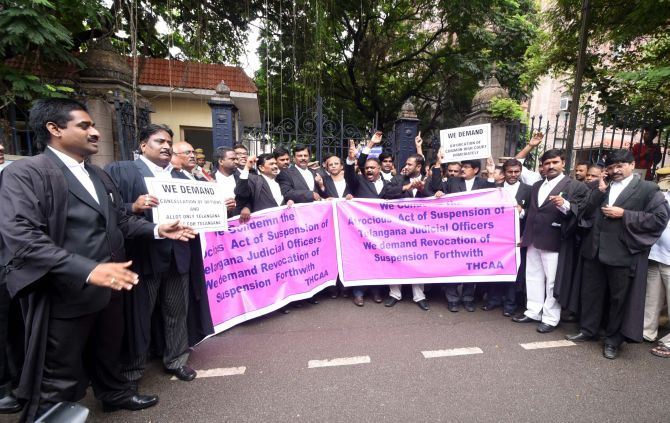 KCR is using politics to highlight an administrative and judicial issue, reports B Dasarath Reddy.
KCR is using politics to highlight an administrative and judicial issue, reports B Dasarath Reddy.
Disrupting the functioning of courts by advocates used to be a common affair at the height of the separate statehood movement that led to the birth of Telangana -- principally because lawyers were in the forefront of the political agitation.
But, even at the peak of the turmoil, not a single district-level judge, not even a magistrate of a lower court violated discipline by joining such protests. However, the tradition was violated when on June 26 and in the following week, judges came out on the streets, more than two years after the state was bifurcated.
Judicial officers hailing from Telangana took out a silent rally to Raj Bhavan protesting the provisional allocation by the Hyderabad high court, of the subordinate judicial officers. This was done on the basis of the options given to them to choose either of the two states for the remainder of their tenure.
The high court, which continues to be the joint apex court of both Telangana and Andhra Pradesh, quickly swung into action by suspending the president and secretary of the subordinate judicial officers association for participating in the protest rally.
However, the action triggered further protests followed by the suspension of nine more judicial officers and 11 other judicial staff, and culminated into a complete shutdown of judicial work with 8,000-odd staff and officers, at all courts up to the district level in Telangana, joining the indefinite protests.
They demanded revocation of suspension of judicial officers and other staff and recall of the provisional allocation of judicial staff among other things. The decision was being questioned by the lawyers associations ever since the list of provisional allocation of judicial officers was put out on May 3 by the registrar general of the high court.
'According to this list, of the 205 judicial officers working in the cadre of district judge as on June 2, 2014 (the date of state bifurcation), the number of officers allocated to Telangana and Andhra Pradesh is 95 and 110, respectively,' Chief Minister K Chandrasekhara Rao explained in a letter addressed to Union Home Minister Rajnath Singh on June 27, the day judicial officers and lawyers intensified their stir.
'Further, of the 95 officers allotted to Telangana, as many as 58 belong to Andhra Pradesh. These officers have been allotted to Telangana in spite of the fact that according to the sanctioned cadre strength of 234 in the undivided state, there are still 29 vacancies in Andhra Pradesh which have not been filled up,' KCR added.
'In all cadres of judicial officers, including senior and junior civil judges altogether, 143 officers of Andhra Pradesh are allocated to Telangana state,' the chief minister said.
The numbers mentioned by the chief minister gives an insight into the imbalance in the recruitment to judicial posts in the undivided state, more or less similar to the appointment of staff in the state secretariat.
The parties and organisations in Telangana drew the first line of support to the separate statehood demand from government staff and lawyers.
The provisional list of allocation has dashed the hopes Telangana aspirants might have had of entry into the judicial service.
It also closes the doors on promotion avenues in the subordinate judicial services in the state as those from Andhra Pradesh will continue to occupy all levels of the promotion ladder, making it impossible for a local man to get a chance for the next ten years at the very least, according to a neutral observer.
Though 'options' was a facility provided to an employee or an officer, irrespective of his or her domicile status, in the process of finalistion of staff and officers under the AP Reorganisation Act 2014, and was also followed in the allocation of government staff between Telangana and Andhra Pradesh, this has become a central issue as more people of Andhra origin had opted to work in Telangana.
But the central objection to this move was based on the premise that the high court had stepped out of its powers in finalising the list of provisional allocation, while this exercise was to be done only by the Government of India, as it was done in case of government staff allocation according to the State Reorganisation Act.
However, Siva Rao, legal advisor to power utilities of both Telangana and Andhra Pradesh, feels the argument of lawyers and subordinate judicial officers of Telangana that no person of Andhra origin should be allocated to Telangana was a bit extreme.
"Both sides need to be flexible on this matter, for instance, some of these officers can be absorbed in the existing vacancies by the respective states. But one cannot say no Andhra officer should be allocated to Telangana because they are there in the system," Rao says.
In a nutshell, there are about 540 Andhra officers against around 450 posts in Andhra Pradesh while there are 220 Telangana officers against 350 posts in Telangana, at all levels of subordinate judicial posts.
Taking a strong position in the wake of discontent over the provisional list of allocation, Chandrasekhara Rao demanded that the Centre must undertake the allocation strictly in accordance with the 'precedents of previous bifurcation of states,' as also according to the provisions of AP Reorganisation Act 2014.
When Chhattishgarh, Jharkhand and Uttarakhand were created, in matters like this, the high courts of both the states had sent proposals to the government of India and the allocations were made only after that.
Further, it was understood that in case of these three states, domicile was the criterion for allotment, according to Chandrasekhara Rao.
He also brought the issue of the pending bifurcation of the high court into this context stating that any allocation could be done only after separate high courts were constituted for Telangana and Andhra Pradesh.
The Telangana government had failed in its attempts to achieve early bifurcation of the joint high court -- going to the extent of offering land and infrastructure for establishing a separate AP high court in Hyderabad itself.
The high court in February last year citing the provisions of the AP Reorganisation Act 2014, ruled against this offer saying that the high court of a particular state could be set up only in the geographical area of that particular state.
According to the provisions of the act, the process of establishment of the new high court begins only after the government of AP identifies the land and location and intimates this to the chief justice. The AP government refuses to do so.
Under these circumstances, the Telangana government has to either impress upon the Centre to amend the AP Reorganisation Act to fast-track the process of high court bifurcation or persuade the AP government to intimate the land and location of the future high court to the chief justice to kick-start the process of bifurcation of the apex court, according to Siva Rao.
But the issue of tentative allocation of subordinate judicial officers between the two sibling states has given an opportunity to Chandrasekhara Rao to politicise the matter. For now, judges of lower courts and other court staff in Telangana returned to work last week after Governor E S L Narasimhan and high court acting Chief Justice Dilip Bhosale intervened.
On the same day, Minister K T Rama Rao declared in Karimnagar that Telangana Rashtra Samithi MPs will stall the proceedings at the monsoon session of Parliament seeking the bifurcation of the state high court.
Politics is centre-stage in Telangana once again.
IMAGE: Lawyers protest in Hyderabad.












 © 2025 Rediff.com -
© 2025 Rediff.com -